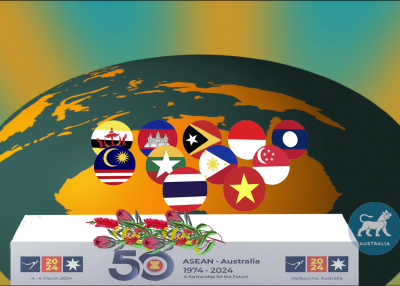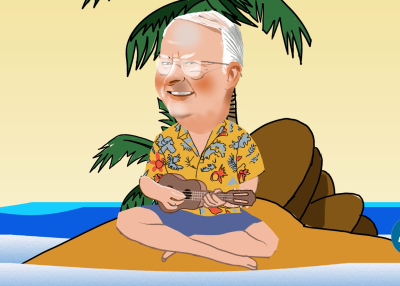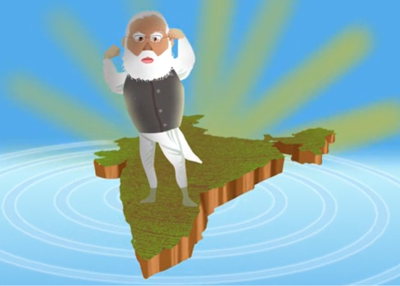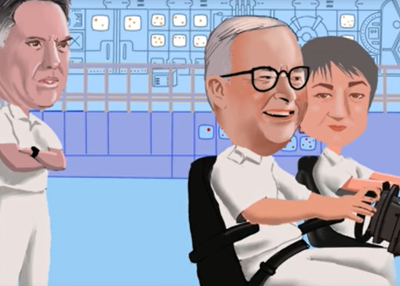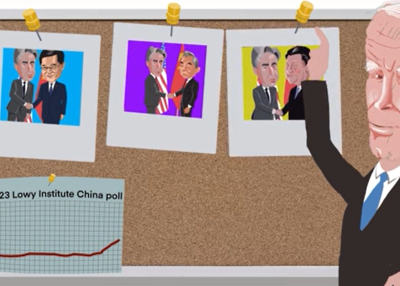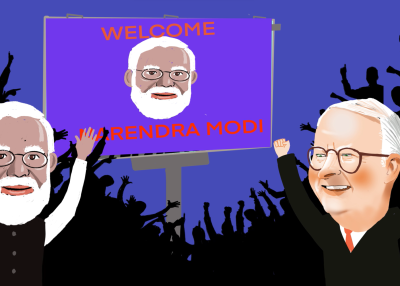Briefing Monthly #56 | November 2022
Malaysia votes | Competing summits | Powering Indonesia l Managing China | Asian students | PLUS: Briefing MONTHLY @ 5
Animation by Rocco Fazzari
COMING OUT
With Russian President Vladimir Putin skulking far away in the Kremlin, the real summit to climb across Asia this month has been to navigate a meeting with re-emerging Chinese President Xi Jinping. Xi met about 20 leaders and about a dozen extra monarchs, international organisation chiefs and leader representatives at the two summits he attended, in China’s highest-level diplomacy for three years. Canadian Prime Minister Justin Trudeau emerged the hard way after apparently revealing details of his private conversation. US President Joe Biden and Prime Minister Anthony Albanese offered more hopeful outcomes.
Albanese notably managed almost as many meetings in a diplomatic reset which he said sent “a message that Australia wants to engage constructively, to work with our partners in the region, and indeed, throughout the world.” He nominated re-engaging with Southeast Asia, raising the profile of Australian business in the region, talking about the AUKUS submarine partnership with Biden, and stepping up engagement with India as highlights.
The somewhat overlapping participants in the G20 and APEC summits restored some crisis management credibility to these organisations by taking a “most countries” consensus approach to criticising the invasion of Ukraine after many preparation meetings were upset by minority support for Russia.
The concluding statements from the four summits run to more than 30,000 words. The once prolix Asia Pacific Economic Cooperation (APEC) group won the brevity prize at 2200 words – but was last in the queue for this wordfest. However, we have the key news from the summits and surrounding meetings focused on Australia and Asia below in half that many words.
But first.... WE'RE 5!
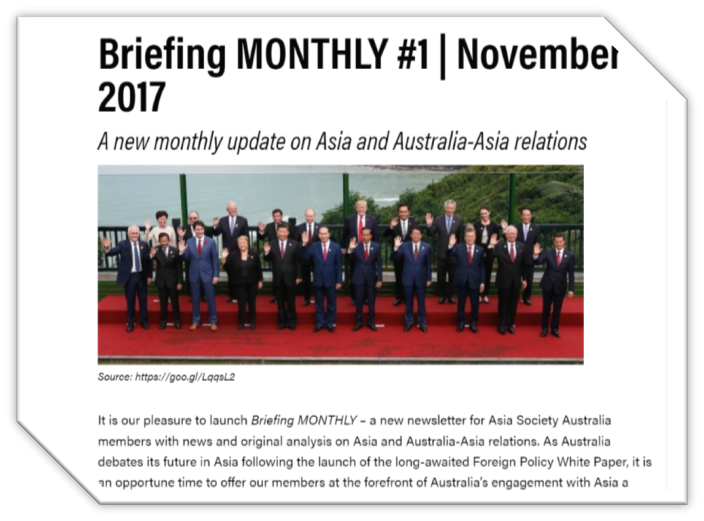
It’s five years since Briefing MONTHLY was launched in November 2017 to report on Australia’s last foreign policy white paper. We promised at a time of shrinking mainstream media coverage of Asia: “Focused on business and geopolitics, Briefing MONTHLY will be distinctly Australian and internationalist. It will highlight trends, deals, visits, stories and events in our region that matter.”
It has been a bountiful ride through changing governments, new diplomatic institutions, refreshed Australian business approaches to the region, a boom and bust in international education, and an epochal shift from globalisation to watch this space. But it has also been a notably circular process.
As the white paper was released we observed: “The Federal government has set out an ambitious public bid for a new Indo-Pacific community of interest with Japan, India, South Korea and Indonesia to deal with less explicitly stated concerns about a much more assertive China and a possibly less engaged US. And a little further down we noted that the then government was publishing a report on business opportunities in Southeast Asia. This month Anthony Albanese has talked up diversified relationships in the region to shield Australia from superpower rivalry and appointed a business-oriented special Australian envoy to Southeast Asia.
Covering Australia’s role in the world’s most vibrant region offers up what Indonesians might call a gado-gado of opportunities. Here are some emblematic highlights.
In March 2018 we took to publishing semi-daily to provide a fuller account of the action around the historic ASEAN-Australia Special Summit in Sydney, demonstrating there was more happening than was reported in other media.
In 2019 we took to the road during India’s ever colourful election and published a campaign diary which careened from the back streets of the Hindu heartland in Uttar Pradesh to the backrooms of the world’s biggest political party in New Delhi.
In March 2020 we produced a detailed early account of the diverse Asian responses to the emerging pandemic and pondered the implications for Australia and the world of these new takes on an Asian “model”.
In April 2021we examined the mid-pandemic state of play with a perennial subject here – the soft power role and export value for Australia of educating Asian students. Some other regular topics also featured: Asian democracy; bilateral v multilateral approaches to diplomacy; language skills; and Team Australia in business.
Elections have always been regular fodder here. This year in January we previewed ten looming regional electoral showdowns. Then we covered every Asian angle of the Australian poll before, during and after the event. And we continued the theme with a special visit to the Philippines to examine another Marcos in power.
Thanks for reading. Feedback and suggestions are always welcome.
Greg Earl (Briefing MONTHLY Editor)
FROM THE PEAKS
ASEAN/EAST ASIAN SUMMITS (Phnom Penh)
Myanmar: The ten member ASEAN group has stopped short of expanding its exclusion of Myanmar representatives from high-level meetings in favour of an ad hoc review of the situation when needed. But in a statement separate to the Summit chairman’s statement of 12,400 words, it has committed to new action to implement its five-point consensus on Myanmar which is widely seen as ineffective. As Indonesia is under pressure to lead more action on Myanmar as the new ASEAN chair, the group has promised to “soon” engage with all stakeholders in the conflict which should elevate the stature of the opposition groups.
Meanwhile, Foreign Minister Penny Wong has emphasised that preparedness to talk with the Myanmar military regime played a key role in the release of Australian economist Sean Turnell from prison, as pressure grows for increased sanctions on the regime. Wong has also thanked the diplomats from both Brunei and Cambodia, who led ASEAN through the period of Turnell’s imprisonment and other regional officials for their support, suggesting that Australia remains more likely to remain relatively aligned with ASEAN over Myanmar rather than other western countries.
New partners: The ten ASEAN countries have upgraded ties with India and the US to comprehensive strategic partnerships, elevating those countries to the status it granted Australia and then China last year creating a hierarchy in which Australia fares quite well.
Australia’s own summit: Albanese has proposed a summit in Australia with ASEAN leaders in 2024 to celebrate the 50th anniversary of Australia becoming the first dialogue partner of the group. The first such summit was held in Sydney in 2018. He also issued a Joint Statement on Cooperation under the ASEAN Outlook on the Indo-Pacific (AOIP) with the ASEAN leaders as Australia is giving the regional group a high profile in its diplomacy after some debate about whether relations with individual countries were more important.
ASEAN trade: Australia has finally upgraded its 12-year trade agreement with New Zealand and ten Southeast Asian countries after several years of talks. The new AANZFTA will have new chapters/ provisions including on small and medium sized enterprises, trade and sustainable development and education services.
ASEAN envoy: Former Macquarie Bank chief executive Nicholas Moore has been appointed special envoy to Southeast Asia, fulfilling a Labor election promise and signalling a more economic focus on this region.
Timor’s rise: Timor Leste has been accepted in-principle as the 11th member of the Association of Southeast Asian Nations (ASEAN) with Australia committing to providing capacity building support for its full membership.
Laos relations: Australia is elevating Laos to a Comprehensive Partnership bringing the country into what is roughly fourth rank of diplomatic recognition and flagging further cooperation in areas including energy, climate and transnational crime. Laos has recently been Australia’s country coordination in ASEAN and will be the chair country in 2024 when Australia wants to host a special regional summit in Australia.
Diplomacy: The 18 member East Asia Summit chairman’s statement, of 6300 words, skirted around the most divisive issues in the region by declaring that some EAS participating countries were concerned about land reclamations, activities, and serious incidents in the South China Sea which had eroded trust and confidence. It also said most participating countries expressed deep disappointment over the lack of progress in implementing the ASEAN countries’ five-point consensus on the Myanmar conflict.
GROUP OF 20 (Bali)
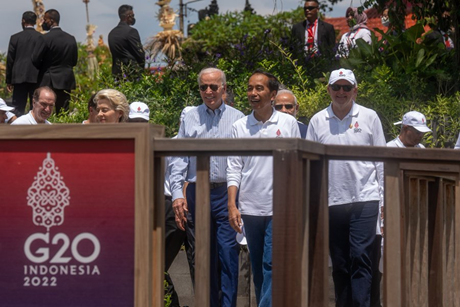
Anthony Albanese (right) with Joe Biden and Joko Widodo Picture: PMO
Consensus rules OK: The G20 leaders appear to have side-stepped the yearlong process of Russia knee-capping communiques from these events by taking a majority view on the Ukraine war. The fiercely negotiated G20 leaders declaration (9700 words), in contrast to the usual joint communique, said that “most members strongly condemned the war” and demanded a complete and unconditional withdrawal. But it but noted there were other views and different assessments of the situation.
Australia-China relations: Albanese has suggested in the days after his meeting with Xi that there had been a “clear indication” from the Chinese leader that the two countries could move forward together. The first such formal bilateral leaders meeting since a 2016 lasted for 32 minutes and Albanese initially played down expectations that anything had been formally agreed at the event.
See MANAGING CHINA below and Richard Maude here.
US-China relations: The three hour meeting between Xi and Biden Xi produced clearer outcomes with Secretary of State Antony Blinken set to visit Beijing to follow up especially on issues of mutual global interest such as climate change, economic stability and debt relief, and health and food security. But the two leaders importantly reiterated their agreement that a nuclear war should never be fought and can never be won and underscored their opposition to the use or threat of use of nuclear weapons in Ukraine, in a subtle shift away from Russia by China.
Business 20: Albanese was one of only three leaders to speak at the B20 and was on the closing session with Indonesian President Joko Widodo which he said advanced Australia’s standing with the regional business community. The Australian delegation was reportedly the largest one at the B20.
Indonesia relations: Albanese has invited Widodo to Australia next year ahead of the Indonesian leader’s departure from office in early 2024 and has declared that the Indonesia relationship is one in which he places “great stake”. Widodo, a reluctant participant in international diplomatic activity throughout most of his eight years in office, has won plaudits from many participants in the meetings for keeping the G20 process going through the Russia/Ukraine process.
Indonesia business links: The Business Council of Australia (BCA) signed an agreement with the Indonesian Chamber of Commerce and Industry (KADIN) aimed at building better business ties in a form of upgrading of business from links between the two bilateral business chambers and via the Australian Chamber of Commerce and Industry links with KADIN. See POWERING INDONESIA below.
Indonesian energy: The US, Japan, and several European countries will support a US$20 billion public/private assistance scheme to help Indonesia bring forward the end of coal generated electricity. It’s the second such scheme after a similar one with South Africa last year and marked a crossover between the G20 meeting and the United Nations climate change conference in Egypt. Australia’s absence has been criticised, but the Albanese government has a review of development finance under way and a plan for a $200 million climate change initiative with Indonesia.
Trade diversification: Fresh from his meeting with Xi, Albanese stepped up Australia’s efforts to diversify its trade by lobbying for the completion or expansion of bilateral agreements with the leaders of the European Union, India and the United Kingdom.
Pacific telecommunications: The US and Japanese development finance agencies will contribute US$50million each in credit guarantees to the Export Finance Australia financing package for Telstra’s purchase of Digicel Pacific in a further tightening of the trilateral partnership for Pacific telecommunications infrastructure.
AUKUS: French President Emmanuel Macron has doubled down on his criticism of Australia’s decision to buy nuclear submarines saying they will increase nuclear confrontation with China and cannot be serviced. The comments after a meeting with Albanese raise questions about how the two countries will manage their re-engagement after France was dumped as a submarine supplier.
ASIA PACIFIC ECONOMIC COOPERATION (Bangkok)
Deepening consensus: The new consensus approach for avoiding vetos on summit statements was reinforced at APEC with Thailand securing a Leaders’ Declaration that used the same words as were used in Bali at the G20 about most members condemning the Ukraine invasion. The APEC leaders also endorsed a work plan towards a Free Trade Area of the Asia-Pacific which would bring together existing trade agreements and a plan to revive cross-border travel and ensure vaccination certificates will be honoured by all member economies.
CPTPP: Albanese’s biggest diplomatic outing since he took office was tarnished by his suggestion that Australia would not support Taiwan joining the Comprehensive and Progressive Agreement for Trans-Pacific Partnership because the island was not a “recognised” nation state. Taiwanese commentators took the suggestion as a concession to China after the meeting with Xi Jinping, but Albanese has since maintained there is no change in Australia’s position that new members must receive unanimous support.
Philippines relations: Australia’s relationship with the Philippines has been upgraded to a Strategic Partnership from the seven year old Comprehensive Partnership after Albanese met President Fidel Marcos Junior in the first top level contact with the new Philippines leader. The Philippines has lagged the upgrading of Australian relations with other major Southeast Asian countries.
India trade: The Federal Parliament’s joint standing committee on treaties has recommended the ratification Australia-India Economic Cooperation and Trade Agreement (ECTA) agreement ratification of the paving the way for bilateral visits by the leaders of both countries in 2023.
North Korea: Australia joined with the leaders of US, Japan, Canada, South Korea and New Zealand to meet and condemn the North Korean nuclear tests in an example of the evolving mini-lateral meetings on the sidelines of the summits.
The Summits in summary:
- Huong Le Thu at Nikkei Asia Review says ASEAN’s claim to centrality in regional diplomacy remains as unclear as ever.
- Brad Glosserman in The Japan Times says the hollowness of “the west” demonstrated by the meetings, shows the need for a new acronym – ROPES (for rules-oriented, process-embracing societies).
- Thitinan Pongsudhirak at The Bangkok Post argues business should take a greater role in running APEC to restore its credibility.
- Adam Tooze at Foreign Policy says that the successful G20 summit shows that “conducting diplomacy in an age of crisis does not mean that things are destined to blow up or fall apart.”
NEIGHBOURHOOD WATCH
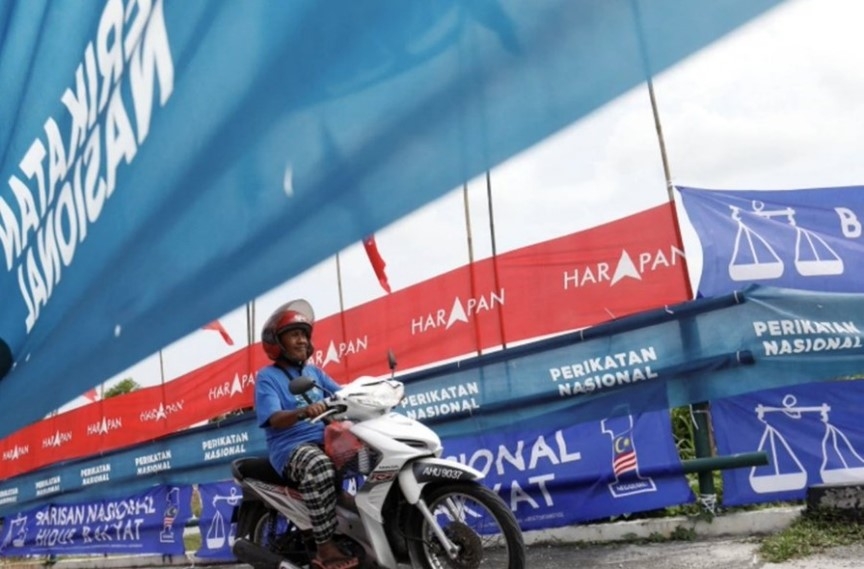
A campaign of coalitions Picture: Reuters
MALAYSIA: AFTER UMNO
It was once the world’s longest running election winning political party, but the United Malays National Organisation (UMNO) has gone from being the emperor of Malaysian politics to possibly just the kingmaker.
Malaysia’s election has underlined the remarkable splintering of the country’s Malay vote into about five parties which began four years ago - but left the country with the dilemma of still assembling a government that will be Malay-led to reflect the dominant ethnic group. So, while UMNO has now only just squeezed in as the fourth largest party by seats (26) in the 222 seat Dewan Rakyat, it will likely be a key player in a hung parliament.
Long-time opposition figure Anwar Ibrahim’s Hope Coalition won the most seats in the 222-member parliament (82) although his own Peoples Justice Party only came third with 31. Meanwhile his former UMNO colleague Muhyiddin Yassin’s National Alliance won 73 seats although his own Bersatu Party only won 24. But the Alliance appears to be more successfully expanding by drawing support from smaller parties in eastern Malaysia.
As we go to publication, Malaysia’s King Sultan Abdullah Ahmed Shah is trying to resolve the country’s first hung parliament by variously giving the first chance at government to Anwar; by pressing for some form of national unity government combining the two leading coalitions; and assessing the real mood of UMNO whose members appear divided over what to do.
And it is a big choice for social harmony in a multi-racial country because the National Alliance is a largely Malay Muslim entity dominated by the conservative Parti Islam SeMalaysia (49 seats), while the Hope Coalition is manifestly multi-racial and more liberal. And from a regional perspective, how Malaysia resolves this impasse will colour perceptions about the declining health of democracy in Southeast Asia.
The new political landscape
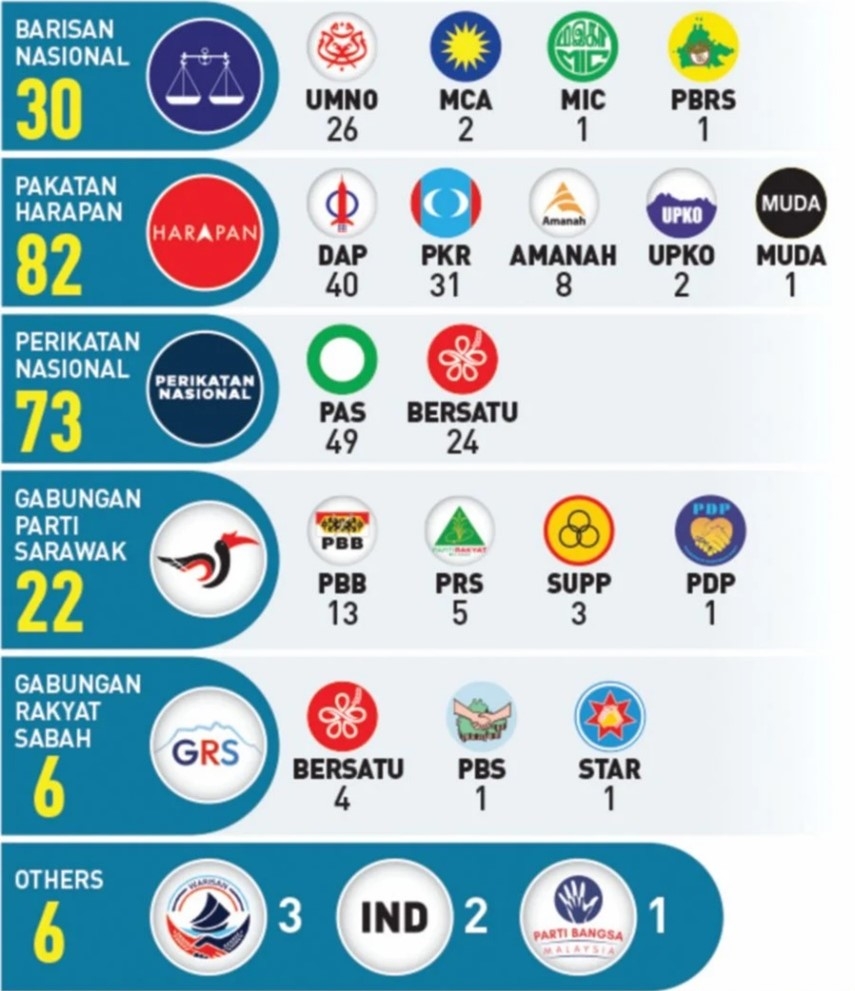
Graphic: New Straits Times
WHITHER KISHIDANOMICS
Despite coming to power with the promise of a new form of people-focused capitalism, Japan’s Prime Minister Fumio Kishida is discovering an old form of modern Japanese democracy – fickle voters.
The moderate Liberal Democratic Party (LDP) politician who took over from the long serving late conservative Shinzo Abe a year ago, has now suffered the sharp opinion poll decline that has often undercut the authority of many newly elected recent Japanese prime ministers. His support has fallen from around 60 per cent to as low as 30 per cent in in about four months. This is unlikely to result in any immediate threat to his leadership given an election is not due for three years and a LDP leadership vote is not due for two years. But the factional and ministerial turbulence emerging in the government may limit his potential for creative policy changes like his new capitalism promise.
Kishida’s problems started with revelations of LDP’s close ties with the controversial Unification Church after the July assassination of Abe and then public opposition to a state funeral. Kishida, leads the fourth-largest faction within the LDP, but had tried to consolidate power by appointing a cross-factional cabinet and in October sacking ministers with ties to the Church. Three Cabinet ministers have now resigned under pressure in a month potentially delaying Budget decisions in early December before the Diet sessions ends on December 10.
COMRADES UNITE
Vietnam’s top leader Nguyen Phu Trong may have flagged potential warmer ties with China by becoming the first foreign leader to meet President Xi Jinping after he won his controversial third term in power. The visit to Beijing has underlined that fraternal Communist Party ties between the two neighbours remain deep despite Vietnam’s diplomatic and economic opening to the west and territorial tensions with China over the South China Sea.
Trong, 78, notably won a third five-year term as the Communist Party of Vietnam’s general secretary last year foreshadowing Xi’s hardening grip of power at the October Chinese Communist Party congress. However, Trong stood down as the country’s president in in 2021 after taking that job in 2018 in what appeared to be a break with Vietnam’s typical sharing of the country’s top positions in recent years. Trong’s power has been in some doubt since 2019 when he was reported to be ill and this was his first overseas visit since then..
Despite Vietnam’s high profile opening to the west, it has become more trade dependent on China in recent years. It has also been potentially unsettled by the Biden Administration’s previous tendency to split the world into democratic and non-democratic blocs. The two leaders issued a long statement emphasising cooperation between the two countries led by the fraternal party connection and noted challenges to their political systems.
- Richard Heydarian writes in The Diplomat that “Vietnam is quietly doubling down on its charm offensive vis-à-vis its fellow communist regime.”
ASIAN NATION
EDUCATING ASIA
Australia should increase and diversify scholarship programs in Southeast Asia in order to build regional human capacity over simply selling education, according to a new report. It says: “Australian government international education policies have not adequately recognised the strategic importance of education ties with Southeast Asia, instead approaching the region through a narrow “market” lens.”
The Crumbling Cornerstone report by the Lowy Institute’s Southeast Asia program director Susannah Patton says while education has been central to Australia’s ties with the region since the 1950s, the growth of alternative education markets mean Australia has lost relative advantage as a destination for future leaders. It notes a declining number of Australian educated ministers in some key Southeast Asian countries.
This should include refocusing on the Australia Awards and reintroducing a merit-based scholarship targeted at the regional countries that do not receive bilateral development assistance from Australia (Thailand, Malaysia, Singapore, and Brunei). The government should also reshape the New Colombo Plan to focus more on long-term study opportunities to ensure it is meeting its original goal of strengthening Australia’s relationships with countries in the broader Indo-Pacific.
The report has been published as a new survey shows a continuing recovery in students planning to study in Australia after the pandemic shutdown. The AECC Global survey of 14,000 students in 147 countries showed that one in three students who had changed their minds about where to study in the past year had shifted towards Australia.
MANAGING CHINA
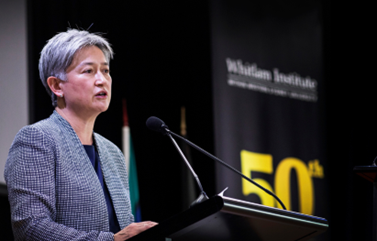
A world long past … Penny Wong Picture: Western Sydney University
With two speeches on the same day substantially about a diplomatic relationship shifting by the day, Penny Wong has provided a framework for managing somewhat improved ties with China.
Delivering the Whitlam Oration first on November 13 she placed the region’s most powerful country in an interesting context given former Prime Minister Gough Whitlam is revered in both Labor and Chinese ranks as the father of modern Australia-China relations.
But Wong elevated independence for Papua New Guinea as Whitlam’s proudest foreign policy achievement and the base upon which he built his other initiatives. This appeared to be both a nod to the importance of the Pacific for the new Labor government and a way to hedge against further difficulty with China becoming a millstone for Labor’s claim to be the better manager of Australia’s foreign relations.
Turning to Whitlam’s breakthrough recognition of China, Wong managed to reprimand both the Liberal Party and the Sinophiles in her own Labor ranks for misunderstanding how to manage the relationship Whitlam fostered. She accused former prime minister Scott Morrison and former defence minister Peter Dutton of weaponising the China relationship for domestic political purposes much the same as former Liberal Prime Minister William McMahon did when Whitlam made his first approaches to China as Opposition Leader in 1971. But then without naming anyone, Wong appeared invoke the Whitlam mantle to criticise Labor identities such as Paul Keating and Bob Carr by arguing: “The China of today is not the same as the China of the 1970s, or even the 2000s. Some may prefer to pretend otherwise, but President Xi himself has made that clear. It is an insult to all Gough did to prepare us for the future if we act as though we live in a world that has long since passed.”
Then in an interesting rewriting of conventional history, Wong claimed better relations with Japan as a third Whitlam achievement via the Nara Treaty signed in 1976 just after he left office, when the Coalition claims the Japan relationship as its own due to the 1957 Commerce Agreement and then the Nara Treaty.
But then flicking the switch to bipartisanship later in the day at the National Foundation for Australia China Relations dinner marking 50 years of diplomatic relations, Wong urged the shadow foreign minister Simon Birmingham to take a more cooperative approach to foreign policy than had been occurring. And there appeared to be the slimmest suggestion of a concession to China’s complaints about foreign investment restrictions: “As an open, trading, nation, Australia has welcomed foreign investment, including from China, while applying a national interest test. We know foreign investment will continue to contribute to Australia’s growth and Australian jobs.”
DEALS AND DOLLARS
POWERING INDONESIA
The push to make a so-called “powerhouse partnership” the core of a new relationship with Indonesia appears to have gained significant new momentum in the past few weeks. Indonesia has long advocated the idea of combining Australian resources with Indonesian manufacturing for export to third countries as a core part of the Indonesia-Australia Comprehensive Economic Partnership (IA-CEPA) trade deal implementation.
The export of Australian wheat to Indonesia for processing and then use in instant noodle for domestic consumption and export is a common example of the sort of cooperation which could knit the two economies together. But this has stepped up amid the Albanese government’s pressure on superannuation funds to invest in Indonesia and Joko Widodo’s ambitions to use Australian lithium for Indonesian-made electric vehicle batteries.
In the key recent developments towards providing new business ballast to the relationship:
- The powerhouse idea was a major topic at the recent Australia Indonesia Business Council conference with Ambassador Siswo Pramono talking about initiatives across agriculture, manufacturing and education.
- Indonesian Chamber of Commerce and Industry (KADIN) chairman Arsjad Rasjid, who also hosted the Business 20 at the G20 Summit, said Indonesian companies were looking at investing in Australian lithium mining.
- The Business Council of Australia signed a cooperation agreement with KADIN with chief executive Jennifer Westacott backing the idea of a bilateral “kind of powerhouse of battery technology”.
- Widodo called on Albanese to support Indonesia’s electric battery manufacturing ambitions by favouring it as a market for Australia’s lithium.
- New Australian investors are looking at Indonesia for complex integrated business ventures including Andrew Forrest’s Fortescue Future Industries in hydrogen and Mike Cannon-Brooks’ Sun Cable in solar energy.
- As already noted, the government has chosen an investment banker Nicholas Moore as its special Southeast Asia envoy.
- For more on the opportunities and challenges involved in the powerhouse partnership see: Charging up old ties with Jakarta
RICE TO VIETNAM
ASX-listed SunRice is partnering with Australian and Vietnamese researchers to develop a new type of rice that could help local farmers adjust to climate change, avoid tropical diseases and get better access to export markets.
The Australia Vietnam Mekong Delta Sustainable Rice Value Chain Project will combine the expertise of the Australian Centre for International Agricultural Research (ACIAR), SunRice, University of Queensland (UQ), An Giang University, Can Tho University and Cuu Long Rice Research Institute (CLRRI) over four years.
SunRice Group chief executive officer Rob Gordon said partnering with ACIAR was an ideal way to improve agricultural sustainability in the Mekong and enhance economic returns for rural communities, while further strengthening the reputation of Vietnam rice in SunRice’s global markets.
ACIAR chief executive officer Andrew Campbell said the partnership with SunRice will improve adoption of more sustainable rice-growing practices in the lower Mekong which is facing the degradation of its food production capacity due to climate change. Assistant Trade Minister Tim Ayres said the project, funded by investment totalling $2.4 million (50 per cent in kind, 50 per cent in cash) from SunRice and $2.6 million in cash from ACIAR, will benefit rice growers across the Delta as well as Australian agriculture.
TAKING THE OFF RAMP
Trade Minister Don Farrell has dumped investor-state dispute settlement (ISDS) clauses in future trade deals and flagged a search for an “off-ramp” in tensions with China in his first major speech on trade policy since the Labor government took office.
Emphasising the need for trade to be a “driver of inclusive growth” and for the need to preserve the capacity to govern in the national interest, Farrell declared that there would be no ISDS provisions in trade deals under the Albanese government. And in another concession to the strong opponents of these clause in Labor’s union base and consumer groups, he made a vague commitment to reforming existing trade agreements where possible.
The decision reopens one of the few clear ideological divides over
trade policy between to two major parties. The Gillard government banned ISDS clauses in 2011 but the Coalition included them in virtually every trade deal since 2013 including the major deals with key Asian partners. Business groups have criticised the decision on the basis that it will make foreign investors more uncertain about investing in Australia. ISDS provisions allow foreign investors to sue governments which change policies although many trade deals contain carve clauses covering issues such as health policies.
Farrell rather symbolically made the announcement at the Australian APEC Study Centre, which is head by former Labor trade minister and ISDS opponent Craig Emerson ahead of the APEC Summit in Bangkok. Speaking just before Anthony Albanese met Xi Jinping in Bali, Farrell also formally outlined the formulation which has become a key part of the rebuilding of relations with China. That is to state that diversification and risk minimisation is the central plant of the government’s trade policy; but that China remains Australia’s largest trading partner; and that the government is open to discussing off ramps from the blockages imposed by China on a range of mostly agricultural products.
DIPLOMATICALLY SPEAKING
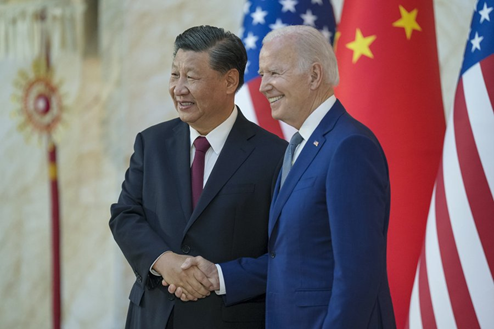
We had an open and candid conversation about our intentions and our priorities. It was clear - he was clear and I was clear - that we’ll defend American interests and values, promote universal human rights, and stand up for the international order, and work in lockstep with our allies and partners. We’re going to compete vigorously. But I’m not looking for conflict, I’m looking to manage this competition responsibly.
- US President Joe Biden November 14
President Xi pointed out the current state of China-U.S. relations is not in the fundamental interests of the two countries and peoples, and is not what the international community expects. China and the United States need to have a sense of responsibility for history, for the world and for the people, explore the right way to get along with each other in the new era, put the relationship on the right course, and bring it back to the track of healthy and stable growth to the benefit of the two countries and the world as a whole.
- Chinese foreign ministry statement November 14
It was a very positive and constructive discussion. And I was pleased that it was held. We know that China is Australia's largest trading partner. They are worth more than Japan, US and Republic of Korea together combined. So, it's an important relationship for Australia. And Australia seeks a stable relationship with China. We have big differences to manage. But we're always going to be better off when we have dialogue and are able to talk constructively and respectfully, but also honestly, about what those differences are.
- Prime Minister Anthony Albanese November 15
President Xi pointed out that for a long time, China-Australia relations had led the way of China’s relations with developed countries and need to be cherished by both sides. In the past few years, however, this relationship has encountered difficulties, which is the last thing we want to see. A mature and stable bilateral relationship should first and foremost be reflected in putting the differences and disagreements between the two countries in the right perspective. It is imperative to rise above disagreements, respect each other and seek mutual benefit and win-win results.
- Chinese foreign ministry statement November 15
DATAWATCH
MIXED MESSAGES
Asian students are talking to each other in ever changing ways.
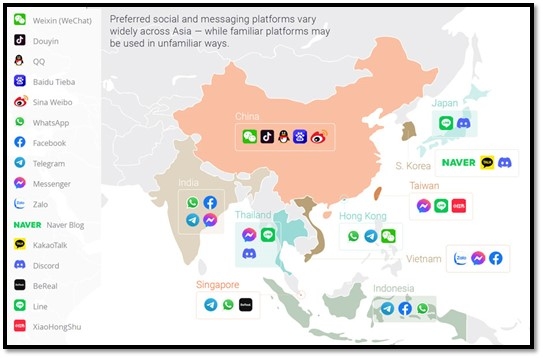
This research by Sinorbis shows that Australian educators need to think more broadly than Facebook when marketing in Asia because the top social media apps being used are quite varied. They are:
- China: WeChat, Douyin (TikTok), QQ, Baida Tieba, and Sina Weibu.
- Japan: Line and Discord
- South Korea: Naver Blog, KakaoTalk, and Discord
- India: WhatsApp, Facebook, Telegram, and Messenger
- Thailand: Messenger, Line, and Discord
- Singapore: Telegram, WhatsApp, and BeReal
- Hong Kong: WhatsApp, Telegram, and WeChat
- Taiwan: Messenger, Line, and XioHongShu
- Indonesia: Telegram, Facebook, and WhatsApp
ON THE HORIZON
NEXT SUMMIT SEASON DIARY
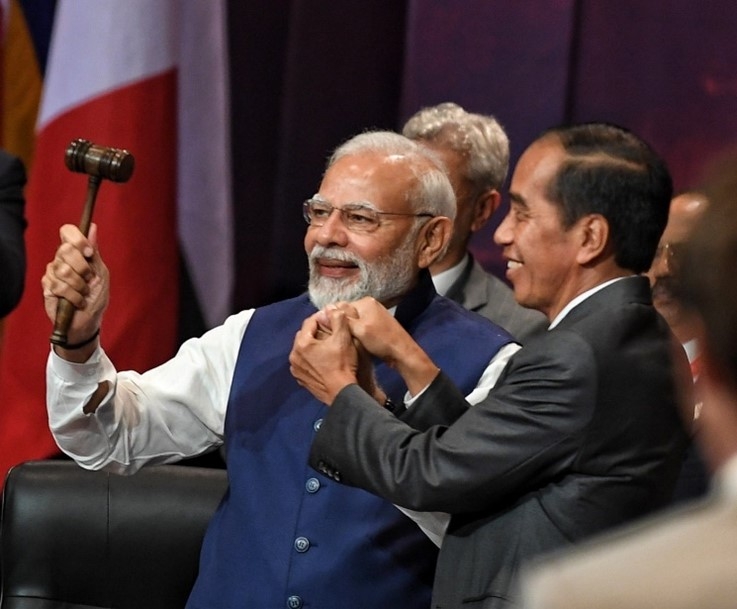
India’s Narendra Modi takes the G20 gavel from Indonesia’s Joko Widodo in Bali.
A year may be a long way off, but next year’s summit season will require some careful planning by Australia to align with how important old and new partners try to shape the agenda for what will be a real Indo-Pacific diplomatic travel scheduling challenge.
APEC: The US will chair 21 member Asia Pacific Economic Cooperation group next year marking the group’s 30th anniversary as a leaders’ summit where it began under the Bill Clinton presidency. But the Biden Administration will face some issues aligning its Indo-Pacific Economic Framework (IPEF) with APEC given the IPEF is, in effect, an APEC like body without China.
EAS: Indonesia takes the leadership of the Association of Southeast Asian Nations (ASEAN) making it also the chair of the 18 member East Asian Summit which should be a breeze after chairing the Group of 20 this year. But Indonesia will face expectations that it should use it stature to push for more progress in resolving the emerging civil war in Myanmar.
G20: India takes the chair of the Group of 20 economic powers for the first time in what has been seen as a symbolic evolution of the group towards reflecting Asian developing country interests after Indonesia’s chair year. Prime Minister Narendra Modi has toughened his approach to Russia’s invasion of Ukraine through this year but will now inherit responsibility for a key platform for dealing with the conflict.
ABOUT BRIEFING MONTHLY
Briefing MONTHLY is a public update with news and original analysis on Asia and Australia-Asia relations. As Australia debates its future in Asia, and the Australian media footprint in Asia continues to shrink, it is an opportune time to offer Australians at the forefront of Australia’s engagement with Asia a professionally edited, succinct and authoritative curation of the most relevant content on Asia and Australia-Asia relations. Focused on business, geopolitics, education and culture, Briefing MONTHLY is distinctly Australian and internationalist, highlighting trends, deals, visits, stories and events in our region that matter.
We are grateful to the Judith Neilson Institute for Journalism and Ideas for its support of Briefing MONTHLY and its editorial team.
Partner with us to help Briefing MONTHLY grow. For more information please contact [email protected]


